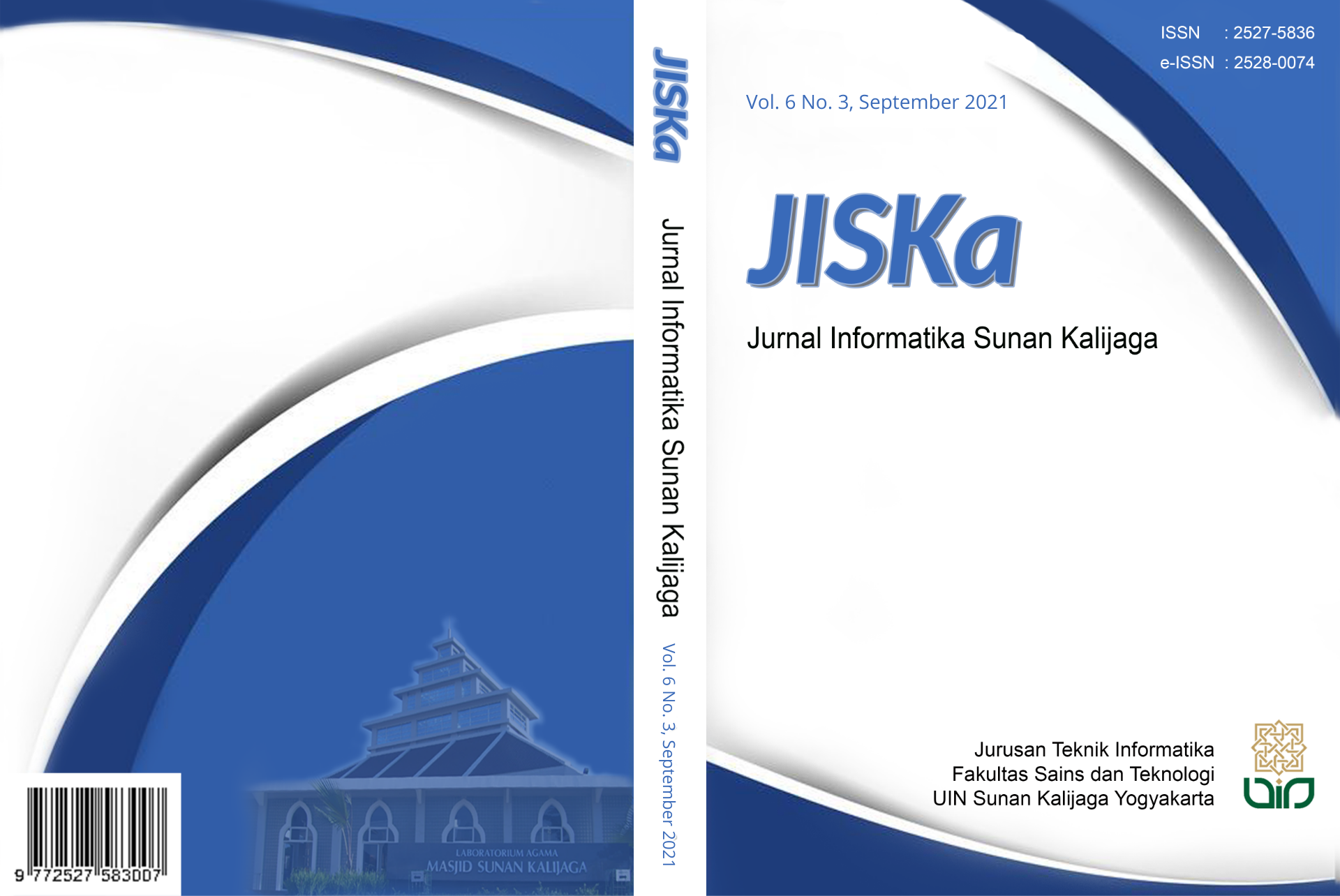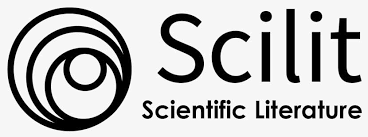Klasifikasi Tingkat Kepuasan Mahasiswa Terhadap Pembelajaran Secara Daring Menggunakan Algoritma Naïve Bayes
DOI:
https://doi.org/10.14421/jiska.2021.6.3.161-170Keywords:
Online Learning, CRISP-DM, Naive Bayes, Classification, Data MiningAbstract
Since the spread of Covid-19 in Indonesia, in early March 2020, the activities of Educational Institutions have not been disrupted. As conventional learning. Learning at Singaperbangsa University began with regulation from the Ministry of Education and Culture of the Republic of Indonesia, from learning that boldly affects concentration, influences concentration, such as signals, learning atmosphere, and teaching methods, so that factors affect the level of student satisfaction in learning. This study aims to determine the level of student satisfaction with learning who dares to use the Bayes naive algorithm using RapidMiner tools with results obtained with an accuracy rate of 76.92%, class precision of 100.00%, class recall 57.14%, and an AUC value of 0.881 or close to, so the resulting model is good. In other words, the results obtained using the Naïve Bayes algorithm can be used as material for making decisions about the level of online learning satisfaction.
References
Adijaya, N. (2018). Persepsi Mahasiswa dalam Pembelajaran Online* *Pengembangan teori dari penelitian berjudul “persepsi mahasiswa terhadap materi ajar pada pembelajaran online” yang telah dipublikasi di Jurnal Eduscience Vol. 3/1. Wanastra: Jurnal Bahasa Dan Sastra, 10(2), 105–110. https://doi.org/10.31294/w.v10i2.3931
Aji, R. H. S. (2020). Dampak Covid-19 pada Pendidikan di Indonesia: Sekolah, Keterampilan, dan Proses Pembelajaran. SALAM: Jurnal Sosial Dan Budaya Syar-I, 7(5), 395–402. https://doi.org/10.15408/SJSBS.V7I5.15314
Amri, S. (2020). Perbandingan Kerangka Model Klasifikasi untuk Pemilihan Metode Kontrasepsi dengan Pendekatan CRIPS-DM. Information Science and Library, 1(1), 14–23. https://doi.org/10.26623/JISL.V1I1.2488
Annur, H. (2018). Klasifikasi Masyarakat Miskin Menggunakan Metode Naive Bayes. ILKOM Jurnal Ilmiah, 10(2), 160–165. https://doi.org/10.33096/ilkom.v10i2.303.160-165
Dhany, H. W., & Izhari, F. (2019). ANALISIS ALGORITHMS SUPPORT VECTOR MACHINE DENGAN NAIVE BAYES KERNEL PADA KLASIFIKASI DATA. Jurnal Teknik Dan Informatika, 6(2), 30–35.
Hastuti, K. (2012). Analisis Komparasi Algoritma Klasifikasi Data Mining untuk Prediksi Mahasiswa Non Aktif. Seminar Nasional Teknologi Informasi & Komunikasi Terapan 2012, 14(1), 241–249.
Pakpahan, R., & Fitriani, Y. (2020). ANALISA PEMANFAATAN TEKNOLOGI INFORMASI DALAM PEMBELAJARAN JARAK JAUH DI TENGAH PANDEMI VIRUS CORONA COVID-19. Journal of Information System, Applied, Management, Accounting and Research, 4(2), 30–36.
Pratama, A., Midyanti, D. M., & Bahri, S. (2020). PENERAPAN NAÏVE BAYES CLASSIFIER DENGAN ALGORITMA STEMMING NAZIEF DAN ADRIANI UNTUK APLIKASI DETEKSI UJARAN KEBENCIAN BERBASIS WEB. Coding Jurnal Komputer Dan Aplikasi, 8(1), 227–236. https://doi.org/10.26418/CODING.V8I1.39457
Purnama, I., Saputra, R., & Wibowo, A. (2012). IMPLEMENTASI DATA MINING MENGGUNAKAN CRISP-DM PADA SISTEM INFORMASI EKSEKUTIF DINAS KELAUTAN DAN PERIKANAN PROVINSI JAWA TENGAH. Prosiding Seminar Nasional Ilmu Komputer UNDIP 2012.
Rezki, M., Kholifah, D. N., Faisal, M., Priyono, P., & Suryadithia, R. (2020). Analisis Review Pengguna Google Meet dan Zoom Cloud Meeting Menggunakan Algoritma Naïve Bayes. Jurnal Infortech, 2(2), 264–270. https://doi.org/10.31294/infortech.v2i2.9286
Sari, Y. R., Sudewa, A., Lestari, D. A., & Jaya, T. I. (2020). Penerapan Algoritma K-Means Untuk Clustering Data Kemiskinan Provinsi Banten Menggunakan Rapidminer. CESS (Journal of Computer Engineering, System and Science), 5(2), 192. https://doi.org/10.24114/cess.v5i2.18519
Siddik, M., Hendri, H., Putri, R. N., Desnelita, Y., & Gustientiedina, G. (2020). Klasifikasi Kepuasan Mahasiswa Terhadap Pelayanan Perguruan Tinggi Menggunakan Algoritma Naïve Bayes. INTECOMS: Journal of Information Technology and Computer Science, 3(2), 162–166. https://doi.org/10.31539/INTECOMS.V3I2.1654
Silvia Siltonga, D., Saifullah, & Dewi, R. (2019). Analisis Metode Naive Bayes dalam Memprediksi Tingkat Pemahaman Mahasiswa Terhadap Mata Kuliah Berdasarkan Posisi Duduk. Prosiding Seminar Nasional Riset Information Science (SENARIS), 427–436.
Supriatna, E. (2020). Wabah Corona Virus Disease Covid 19 Dalam Pandangan Islam. SALAM: Jurnal Sosial Dan Budaya Syar-I, 7(6), 555–564. https://doi.org/10.15408/SJSBS.V7I6.15247
Wulandari, F., Jusia, P. A., & Jasmir, J. (2020). Klasifikasi Data Mining Untuk Mendiagnosa Penyakit ISPA Menggunakan Metode Naïve Bayes Pada Puskesmas Jambi Selatan. Jurnal Manajemen Teknologi Dan Sistem Informasi (JMS), 2(3), 214–227.
Downloads
Published
How to Cite
Issue
Section
License
Copyright (c) 2021 Ami Natuzzuhriyyah, Nisa Nafisah, Rini Mayasari

This work is licensed under a Creative Commons Attribution-NonCommercial 4.0 International License.
Authors who publish with this journal agree to the following terms as stated in http://creativecommons.org/licenses/by-nc/4.0
a. Authors retain copyright and grant the journal right of first publication with the work simultaneously licensed under a Creative Commons Attribution License that allows others to share the work with an acknowledgement of the work's authorship and initial publication in this journal.
b. Authors are able to enter into separate, additional contractual arrangements for the non-exclusive distribution of the journal's published version of the work (e.g., post it to an institutional repository or publish it in a book), with an acknowledgement of its initial publication in this journal.
c. Authors are permitted and encouraged to post their work online (e.g., in institutional repositories or on their website) prior to and during the submission process, as it can lead to productive exchanges, as well as earlier and greater citation of published work.







